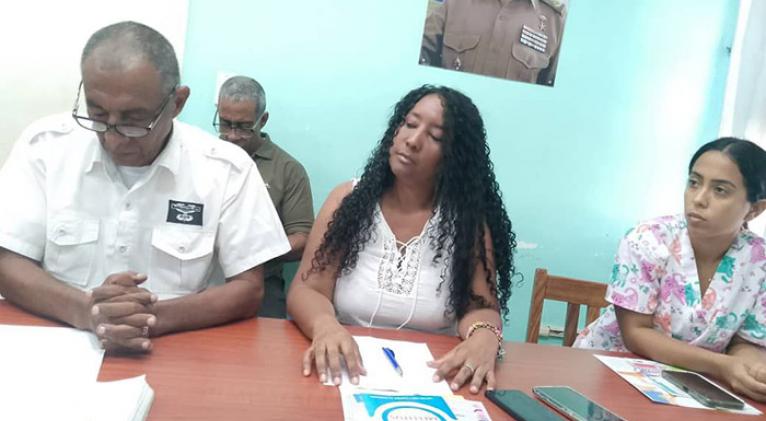Santiago de Cuba Reinforces Sanitary Measures Against Arboviruses
especiales

Santiago de Cuba province is confronting a sustained increase in non-specific febrile syndromes since epidemiological week 40, with active transmission reported in the municipalities of Santiago de Cuba and Palma Soriano, according to Yaimara Gutiérrez de la Cruz, Director of the Provincial Center for Hygiene, Epidemiology and Microbiology (CPHEM).
Gutiérrez de la Cruz indicated that the health areas of José Martí, Frank País García, Carlos J. Finlay, Ramón López Peña, 30 de Noviembre, Armando García, and Ernesto Guevara in Boniato are reporting the highest incidence rates. This situation is exacerbated by increased rainfall, which favors the proliferation of the Aedes aegypti mosquito.
Ana Leyva Fuentes, Head of the Communicable Diseases Department, specified that dengue is the arbovirus with the greatest potential for complications, particularly in individuals with comorbidities such as hypertension and diabetes. Warning signs include vomiting, diarrhea, and abdominal pain.
Cases of chikungunya have also been reported. This disease shares symptoms like fever, headache, and muscle pain but is distinguished by joint inflammation and stiffness. Although it carries a lower risk of severe complications, it can cause prolonged sequelae, she explained.
To a lesser extent, she added, the presence of the Oropouche virus, transmitted by the Culicoides parabenes midge, has been detected, with symptoms including vomiting and diarrhea.
Alfredo Cintra Guerra, Deputy Director of Vector Control, warned that the vector infestation index remains high across all municipalities.
He noted that while resources are insufficient to treat every home weekly, case response is guaranteed. This includes fumigation, application of larvicide (abate), introduction of larvivorous fish in water reservoirs, and focal control in blocks with active transmission.
The provincial incidence rate is 1.74 breeding sites per 100 homes inspected, with higher figures in Santiago de Cuba (2.7), Palma Soriano (1.8), Mella, and Contramaestre (over 2.5). More than two thousand breeding sites have been detected, exceeding the average for the last five years, he detailed.
Cintra Guerra added that the vector control workforce is below 80 percent capacity. Therefore, a call has been made for workers from the Health, Education, and National Institute of Sports, Physical Education and Recreation sectors, as well as interested individuals, to join this paid work after receiving training.
He specified that from October 22 to 25, extra-domiciliary treatment, known as "fogging truck" operations, is being carried out in the José Martí, Frank País, López Peña, and 30 de Noviembre health areas.
Health authorities reiterated the importance of citizen co-responsibility in eliminating breeding sites: conducting weekly home inspections, securely covering water containers, cleaning vacant lots, and seeking immediate medical attention upon experiencing any febrile symptoms.
The use of aspirin and ibuprofen is contraindicated due to their anticoagulant effect. For infants, teas or home remedies should not be administered due to the immaturity of their digestive system. Maintaining breastfeeding and hydration with oral rehydration salts (ORS) is recommended.
Dr. Gutiérrez de la Cruz confirmed the simultaneous circulation of dengue serotypes two, three, and four in the province. While serotypes two and three have been previously present in the population, serotype four has shown lower prior incidence, generating greater susceptibility, particularly in pediatric age groups.
This coexistence of several serotypes increases the risk of complications, especially when variants like two and four combine. This is why it is crucial that diagnosis and treatment are defined by the healthcare system, she emphasized.
The current protocol mandates hospital admission for children under two years of age, elderly adults with comorbidities, pregnant women, postpartum women, and patients unsuitable for home care. All other cases are managed at home under medical supervision.
The specialist reminded the public that dengue can be successfully managed with timely action and adequate hydration. In the absence of ORS, a homemade solution can be prepared using one liter of boiled water, two tablespoons of sugar, one teaspoon of salt, and lemon juice.
This fight will not be effective through the actions of the health system alone; every person must assume their role in active surveillance and prevention within their own environment, she concluded.
To date, Santiago de Cuba has reported no fatalities from dengue, which is considered a reflection of the medical personnel's commitment and the effectiveness of the measures implemented in the territory.














Add new comment